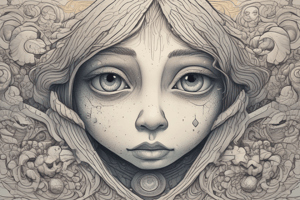Podcast
Questions and Answers
A significant proportion of adult mental illness starts before the age of 18 years.
A significant proportion of adult mental illness starts before the age of 18 years.
True (A)
Mental illness in childhood has no impact on a child's developmental trajectory.
Mental illness in childhood has no impact on a child's developmental trajectory.
False (B)
Children usually initiate psychiatric consultations on their own.
Children usually initiate psychiatric consultations on their own.
False (B)
Repeated bedwetting is considered normal in a 1-year-old child but abnormal in a 7-year-old child.
Repeated bedwetting is considered normal in a 1-year-old child but abnormal in a 7-year-old child.
Healthy children are never brought to doctors by over-anxious parents.
Healthy children are never brought to doctors by over-anxious parents.
Children's responses to life events do not change with age.
Children's responses to life events do not change with age.
The practice of child psychiatry and adult psychiatry is identical in approach and considerations.
The practice of child psychiatry and adult psychiatry is identical in approach and considerations.
Evidence of a child's thoughts in child psychiatry often comes from observations of behavior rather than verbal expression.
Evidence of a child's thoughts in child psychiatry often comes from observations of behavior rather than verbal expression.
Child psychiatry includes the assessment and management of psychiatric disorders in children and adolescents.
Child psychiatry includes the assessment and management of psychiatric disorders in children and adolescents.
Autism spectrum disorder (ASD) and anxiety disorders are not considered principal syndromes in child psychiatry.
Autism spectrum disorder (ASD) and anxiety disorders are not considered principal syndromes in child psychiatry.
Language development and attachment in infancy are part of normal development considerations in child psychiatry.
Language development and attachment in infancy are part of normal development considerations in child psychiatry.
A multidisciplinary approach to treatment emphasizing psychological interventions is not recommended in child psychiatry.
A multidisciplinary approach to treatment emphasizing psychological interventions is not recommended in child psychiatry.
Rapid motor, sensory, and social development occurs in the first year of life and includes the development of social skills and attachment to the primary caregiver.
Rapid motor, sensory, and social development occurs in the first year of life and includes the development of social skills and attachment to the primary caregiver.
There is limited evidence base for pharmacological interventions in child psychiatry, making psychological interventions more emphasized.
There is limited evidence base for pharmacological interventions in child psychiatry, making psychological interventions more emphasized.
Flashcards are hidden until you start studying
Study Notes
Importance of Child Psychiatry
- A significant proportion of adult mental illness begins before the age of 18 years.
- Childhood psychiatric disorders can impact developmental tasks and affect a child's life trajectory.
Unique Aspects of Child Psychiatry
- Children are dependent on adults to help them with their problems.
- Referrals often depend on the attitudes and tolerance of adults, such as parents or teachers.
- Healthy children may be referred due to over-anxious adults, while severely disturbed children may be neglected.
Considerations in Child Psychiatry
- The child's stage of physical and cognitive development affects what is considered abnormal.
- Bedwetting is normal in 1-year-olds but abnormal in 7-year-olds.
- Children's responses to life events change with age.
- Separation from a parent affects children differently according to their age.
Assessing Children
- Children may be less able to express their thoughts in words.
- Observations of behavior are used to gather evidence of intolerance or actions.
Child Psychiatry
- Child psychiatry is a branch of medicine that focuses on the mental health of children and adolescents.
General Issues
- Psychiatric disorders in children and adolescents are frequent, with multiple causes, and require assessment and management.
Principal Syndromes
- Attention-deficit/hyperactivity disorder (ADHD) is a common psychiatric disorder in children and adolescents.
- Autism spectrum disorder (ASD) is a neurodevelopmental disorder that affects communication and social interaction.
- Anxiety disorders, depression, conduct disorder, oppositional defiant disorder (ODD), eating disorders, tic disorders, and sleep disorders are all psychiatric conditions that can affect children and adolescents.
Normal Development
Infancy
- Attachment to caregivers is crucial for normal development.
- Language development, motor development, and social development are rapid during infancy.
Childhood
- Cognitive development, emotional development, and social development are critical during childhood.
Adolescence
- Puberty is a significant physical and hormonal change during adolescence.
- Identity formation and peer relationships are crucial during adolescence.
The First Year of Life
- Rapid motor, sensory, and social development occur during the first year of life.
- Attachment to primary caregivers is essential for normal development.
- Language development, social skills development, object permanence, and separation anxiety are significant milestones during the first year.
Important Considerations
- A multidisciplinary approach to treatment is essential for managing psychiatric disorders in children and adolescents.
- Psychological interventions are emphasized due to the limited evidence base for pharmacological interventions.
- Ethical considerations are crucial when treating children and adolescents with psychiatric disorders.
Studying That Suits You
Use AI to generate personalized quizzes and flashcards to suit your learning preferences.




